
Surrounded by chaos, Niger is a nation on the edge
The West African country, a crossroads for trade and transit in one of the world's roughest regions, is clinging to stability. But for how long?
Just before dusk, the first pickup trucks roll past the checkpoint and array themselves across the desert on the outskirts of Agadez, Niger.
Passengers pile in, as many as 25 per vehicle, each carrying no more than a knapsack. They wear sunglasses and scarves to fend off the sand, along with heavy coats for the biting-cold nights on the three-day journey to Libya.
Their youth is palpable. Squeezed together among strangers, they fidget and stare listlessly at the empty landscape awaiting them. Vendors with rusty pushcarts hawk thirdhand coats, sugarcane, plastic bags of water, cigarettes, and wooden poles to use as braces against the possibility of falling out and becoming stranded in the lawless, desolate Sahara as the unpitying motorcade recedes.
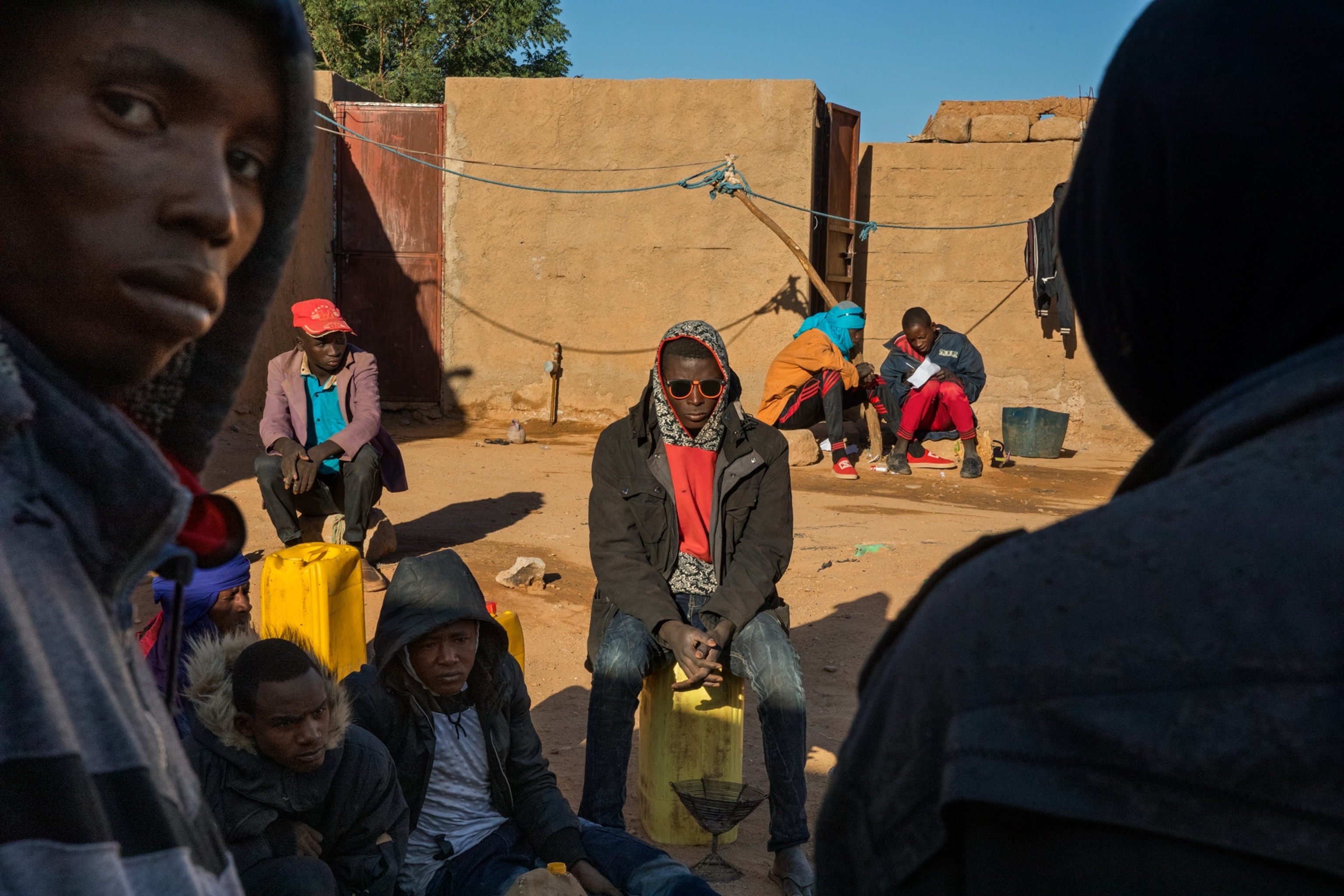
Trucks keep arriving. More than a hundred will assemble by the time the procession begins. Two military vehicles lumber forth—one to lead, the other to guard the rear. As night falls, a swarm of motorcycles materializes and surges past the city’s checkpoint, ferrying a frantic, last-minute wave of aspiring travelers who wish to negotiate their way into the overstuffed pickups. Amid the swirling sand and the pell-mell assimilation of the stragglers, one motorcycle skids to a halt. Even seated, the rider is a large, imposing figure. With an undomesticated beard and a toothpick wedged between his lips, he considers the melee with an incongruously beatific smile.
Then he cackles: “Rice and beans!”
The Boss—which is what everyone in Agadez calls the man—is not describing food. He refers, instead, to the composition of the convoy. You have rice: the many hundreds of Nigerien passengers who have joined this weekly caravan to Libya to find work. Then you have others, the beans—no more than maybe seven per pickup—who are from elsewhere, and who are headed elsewhere, for reasons of their own. It is the Boss’s recipe. He is, you could say, an exporter of beans. Countless thousands of them, since he first entered the business in 2001 and continuing even after Niger’s government made it illegal in 2015.
The flow of travelers has not stopped, and it will not stop. West Africa’s intensifying instability guarantees this. The Boss’s job is to manage the flow. As a passeur, he sits at the top of a shadowy network, possibly the biggest in Agadez, consisting of at least a hundred drivers and about as many coxeurs, subordinates who handle the arrangements. Before the trucks arrive at the checkpoint, they obtain their authorization papers at the Agadez bus station from a city official, who happens to be the Boss. Payments are made. Papers signed. Eyes averted. The journey begins.
“They know me everywhere,” he declares. “Even on the internet, you find pictures of the Boss with immigrants.” He facilitates their trans-Saharan passage from Agadez to the central Libyan city of Sabha. Then he enlists a counterpart to guide them from Sabha to Tripoli, and another to ferry them across the Mediterranean to the West. Where the travelers ultimately wind up—in Italy, in the United States, in a deportation cell, or left to die in the desert or to drown in the sea—is outside the Boss’s purview.
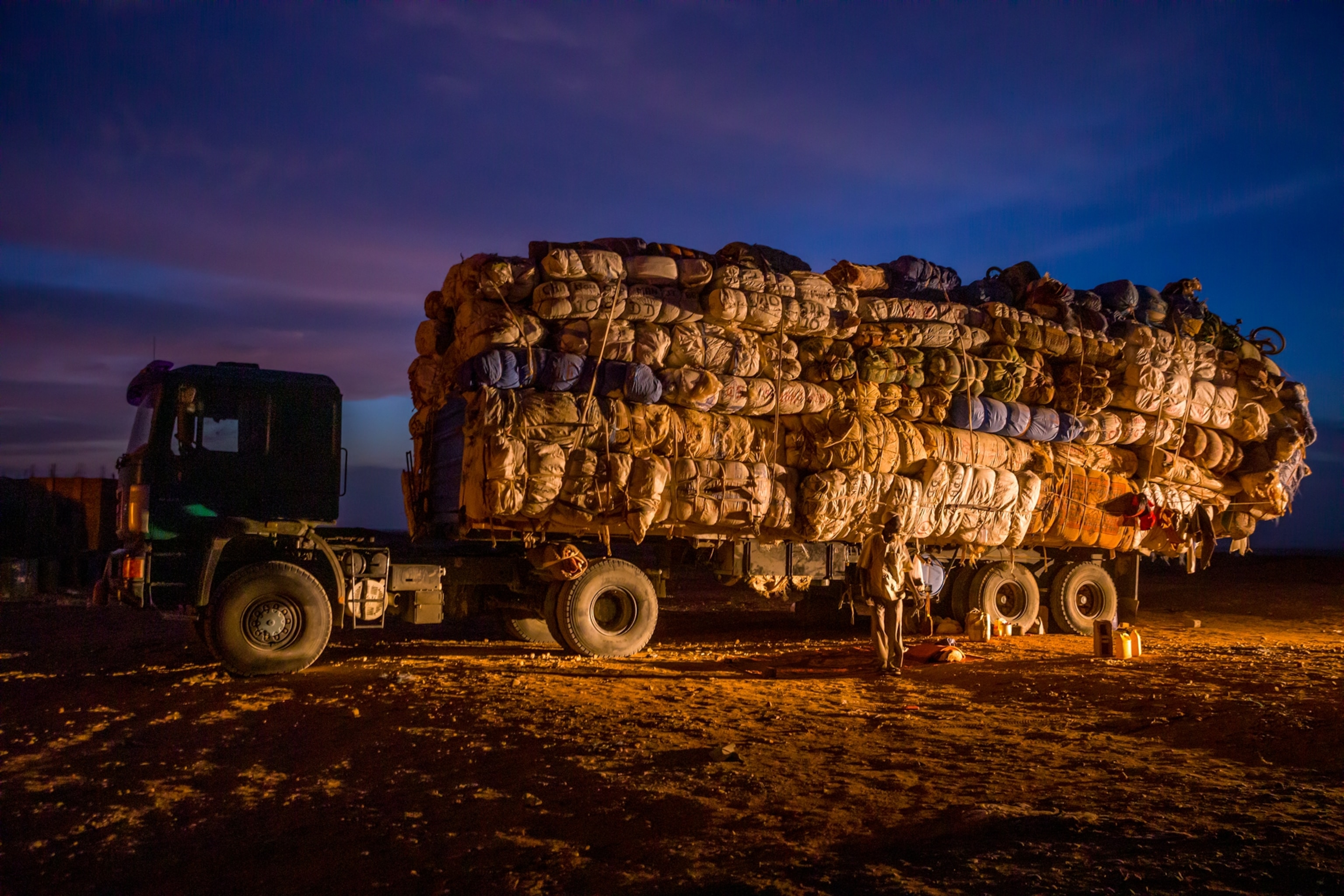
Still, something deeper than a trickster’s boast is evident when he proudly recalls a client who made her way from Cameroon to Agadez to Germany in less than two weeks. A criminal to some, the Boss, who owing to the shadiness of his enterprise does not divulge his name, would prefer to think of himself as a highly entrepreneurial public servant.
The boss is, above all, a stabilizer in a region with few such actors. To the uninitiated, the tableau at the checkpoint looks out of control. But it is not. A system is at work—one that is understood by all and benefits many. Being illegal, it is not the best system. But it is a creative solution to an unavoidable fact, which is that Niger is surrounded by chaos. Though it is a country of myriad woes—deep poverty, rising population, a shortage of arable land made worse by desertification, and a shaky political system—it is not the incubator of violence that its neighbors are. It is a country people flee through, not flee from. Niger’s fate depends on whether it holds off the chaos and maintains a semblance of order, or succumbs to it altogether.
The Boss’s role in Niger’s drama of brinkmanship did not become apparent to me until one Sunday morning, when he and I spent several hours driving together through the migrant “ghettos” of Agadez. It is an ancient, low-slung city with a sultan’s palace and a 500-year-old mosque at its historic center, the outlying neighborhoods composed largely of mud and straw, with more than 130,000 inhabitants, not counting the Boss’s many clients just passing through.
We found some of the latter behind mud-brick walls, killing time quietly in back rooms, waiting for the Monday convoy. Four boys, 15 to 18, from Burkina Faso, Mali, and Ivory Coast, eyes glassily attuned to a small TV. A wiry 50-year-old man from Cameroon hoping to rejoin his wife in Germany but for now pacing in an unlit room with walls covered in graffiti from others in transit: Ezekiel. Tala. Cherif Kante. May God help us all. Two brothers from a Burkina Faso village, skinny but with impeccable teeth, impeccably innocent: had not gone to school, did not know their ages, had a brother waiting in Algeria, had only a change or two of clothes, hoping somehow to get to a place called Europe.
That same morning, the day before the convoy was to head out, the Boss escorted me behind a wall and into a courtyard littered with rusted car parts, where a couple dozen young African men—most but not all from Niger—were sleeping or smoking in the shade. An 18-year-old from Agadez named Mohammed was tinkering with the engine of his pickup. He had returned from Libya with the convoy just two hours earlier and was visibly groggy. Tomorrow he would be northbound again. Mohammed said that he had been traveling this circuit every week since he was 15. Bullet holes scarred the passenger seat and left-rear fender of his battered truck. He had been held up in the desert four times in the past three years. Mohammed assured me that such experiences had scared the hell out of him. He had been an auto mechanic and still did repair work, he said, but added, “The money is better here.”
The teenage truck driver, his fidgety passengers, even the Boss: In the end, their stories converge. Unrest is the abiding narrative of West Africa. It is a region thrashed by economic despair, spiking and drastically shifting population, environmental degradation, political instability, and, increasingly, violence. It is spinning out of control. And Niger, haloed as it is by five of the continent’s greatest incubators of Islamist extremist groups—Algeria and Libya to the north, Mali to the west, Chad to the east, and Nigeria to the south—is poorer than all of them and yet the most pacific, for now. As the U.S. ambassador to the country, Eric Whitaker, gently puts it, “Niger is a good country in a rough neighborhood.”
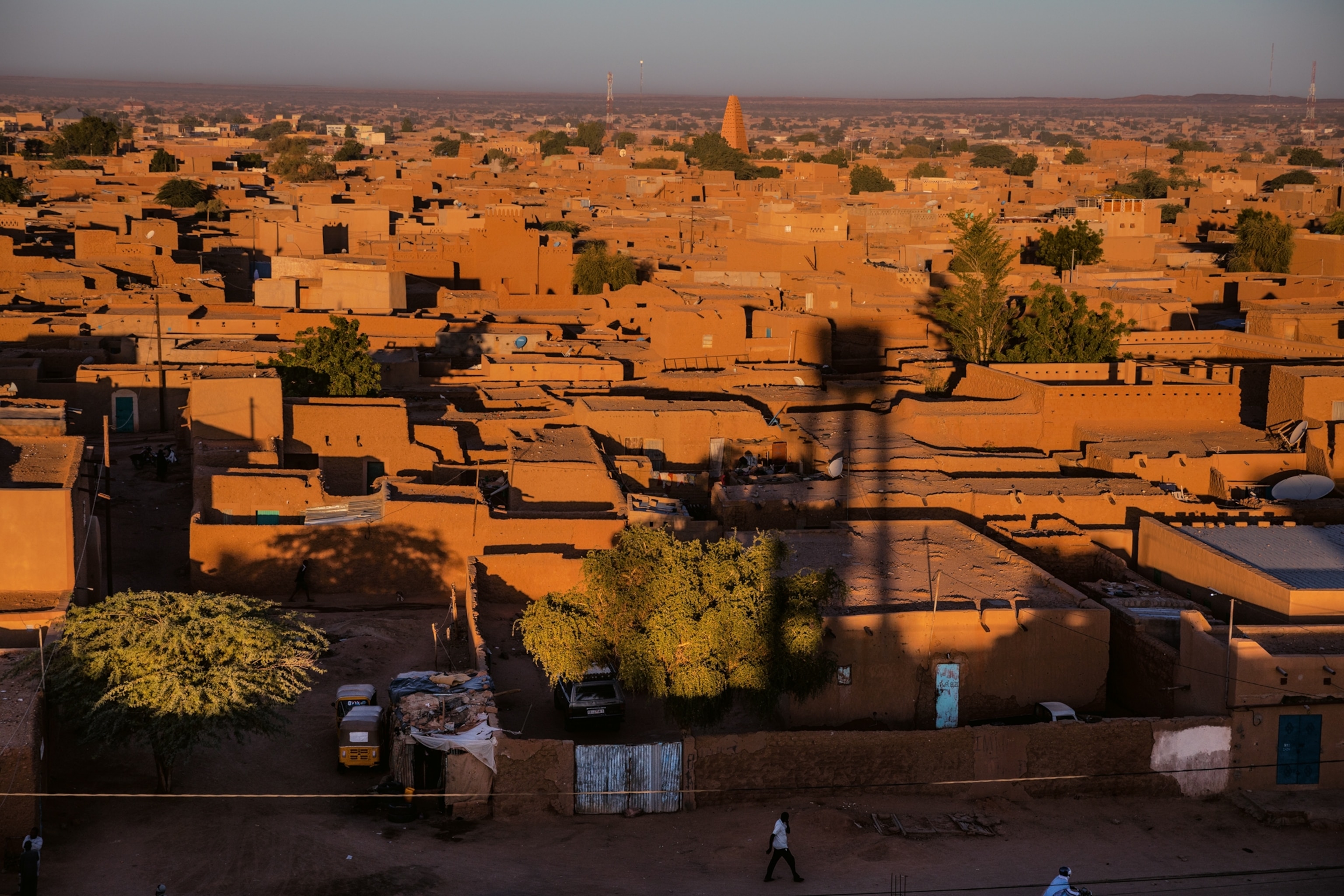
Preserving its safe distance from peril is a vexing proposition. But given the country’s status as “a critical actor in regional efforts to counter terrorism and promote stability” (as the State Department puts it), a tacit understanding among some Western powers seems to have coalesced: Lose Niger—the one country in its “rough neighborhood” that has not become a cauldron of violence and extremist activity—and all bets are off. It is why an air base was being built by the U.S. Air Force on the outskirts of Agadez when I was there and why U.S. special operations forces have participated in counterterrorism missions in Niger—one of which in October 2017 led to the deaths of four U.S. soldiers, four Nigerien soldiers, and a Nigerien interpreter in an ambush by Islamist militants. It is why foreign aid makes up 40 percent of Niger’s budget. It is also why the Boss, while dispersing West Africans across the globe, is in his own paradoxical way helping to hold a region together that could very easily come apart.
One morning the Boss paid a visit to my hotel in Agadez. He slouched in a chair on the patio, wearing sunglasses and a turban, a toothpick in his mouth, brooding as he listened to a French radio program on his smartphone. Eventually he muttered, “The European community has blocked everything. Tourism, migration, the mines. What else is there to do but sleep? Someone bites you and then tells you not to cry.”
The villagers of Goofat, an hour’s drive from Agadez, gathered one day last December. Mostly Tuaregs, a semi-settled, largely Muslim group, they were electing a chief for the first time. The event was one of scrupulous fanfare. A cow was slaughtered, and a band played folk songs. The women wore gold jewelry with their faces tinted yellow as they sat cross-legged on rugs. The men wore bright turbans and their best robes. One by one, a representative from each of the village’s 270 or so families—often a woman—was called by last name to fill out a ballot for or against the sole candidate and drop it into a plastic bin.
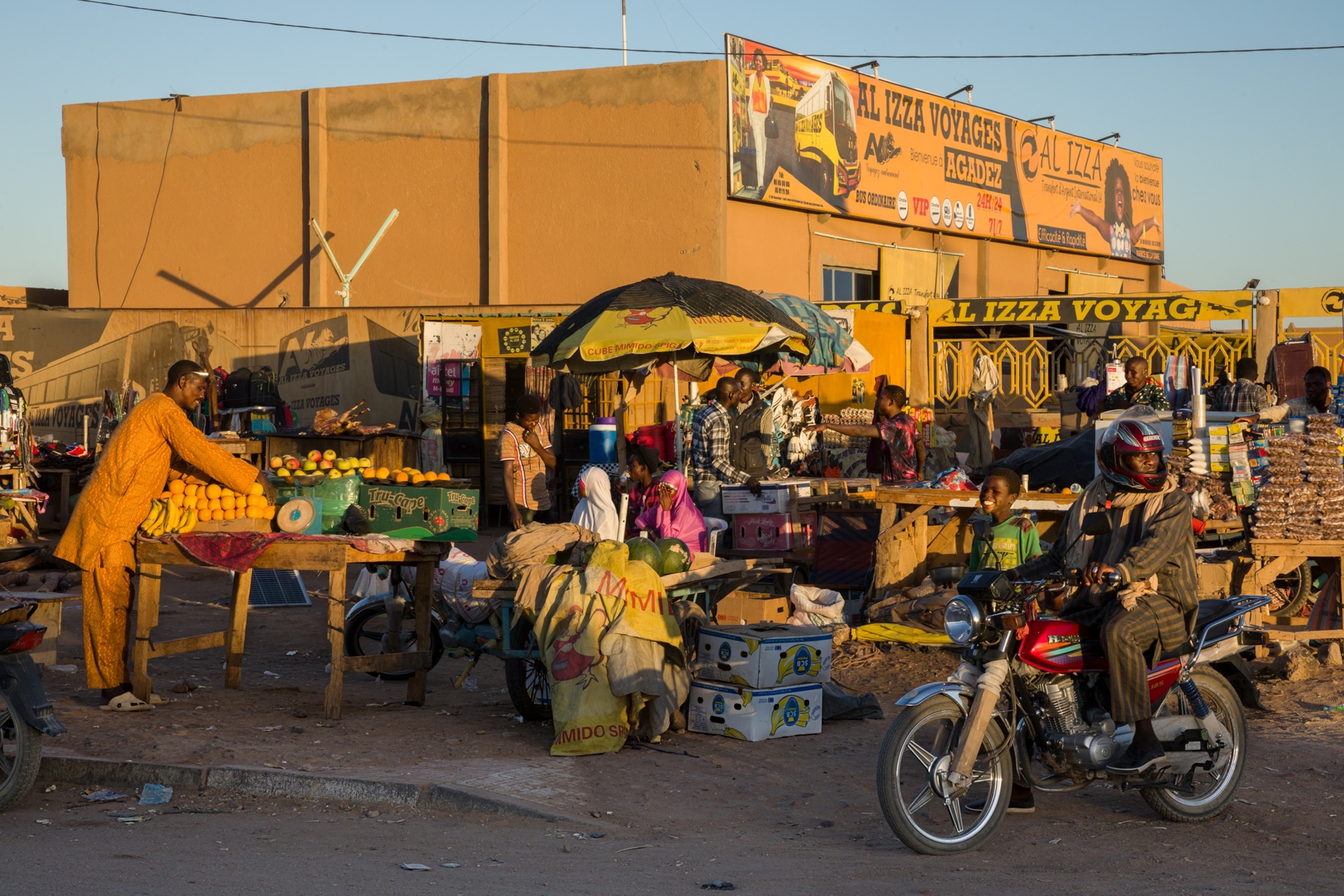
After nearly two hours of voting and ballot counting, the landslide winner, a slender, middle-aged man from the Kourouza family, dutifully stepped forward, took his place in a chair, and affected a regal scowl while village elders solemnly wrapped his head in a purple turban.
Beneath the pageantry, however, lurked a disquieting reality: The families elected Mohamed Kourouza chief because they had decided Goofat had grown too big to remain ungoverned. Infants and small children far outnumbered the adults in their dazzling wardrobes. The agrarian village’s population, about 2,300, has roughly doubled in less than 20 years. With more babies comes the need for more schools, more social services, and more grazing land, along with the potential for more conflict. Writ small, Goofat is the cautionary parable of Niger—a country nearly twice the size of Texas, with about three and a half times its fertility rate but a mere 0.5 percent of its gross domestic product.
Even by a troubled continent’s standards, Niger’s predicament is grave, bracketed by two sobering statistics: a GDP per capita of about a thousand dollars, one of the world’s lowest, and a fertility rate of seven births per woman, which is the highest. But demography does not fully explain the precarious state of Niger. As a landlocked desert country, it has faced punishing droughts, and climate change is expected to make them harsher. Poverty and environmental fragility have in turn exacerbated political instability.
Since gaining independence from France in 1960, Niger has endured four military coups, the latest in 2010. In the past 30 years, it has also experienced two bloody Tuareg rebellions. The most recent, which ended a decade ago, left an abiding scar across the largest of Niger’s eight regions, Agadez. Until then, the city of Agadez had been a tourist gateway to the Sahara, receiving up to 20,000 visitors annually, many via direct flights from Paris. The three years of violent skirmishes between the rebels and Niger’s army had the effect of vaporizing the predominant industry. The travel business began to regard Agadez as a zone rouge.
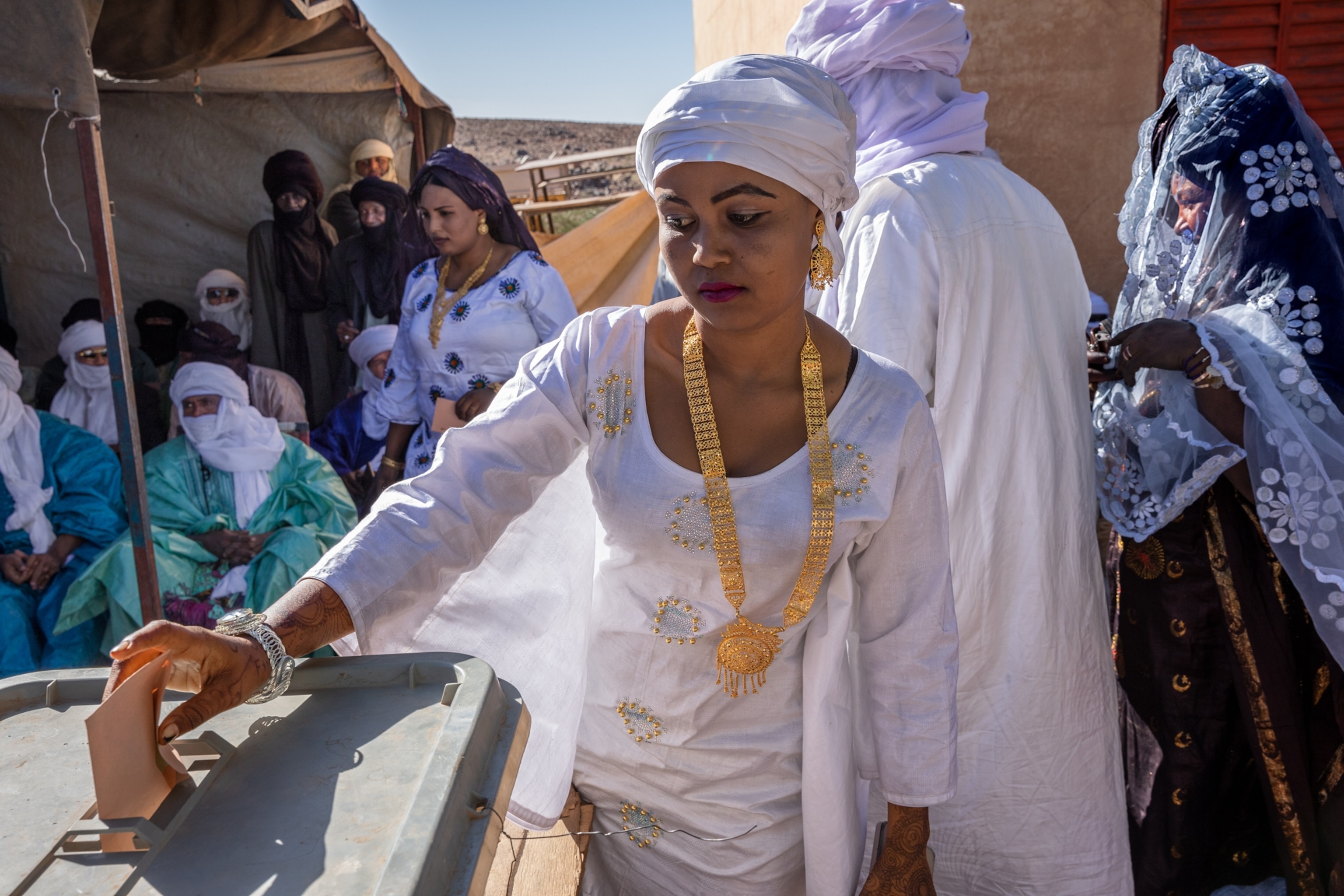
Into the void stepped the Boss and others in the migrant-moving trade. Because of the city’s geographic position, Agadez—derived from the Tuareg word egdez, “to visit”—had for centuries been a transit point for salt caravans and other camel-borne nomadic traders. As a hub for African migrants, Agadez was well situated and, for that matter, well equipped with former tourist guides and drivers.
“As many as 300,000 migrants came through here every year,” recalled the city’s mayor, Rhissa Feltou. “Drivers, hotels, markets, banks, telephone companies—the whole city benefited.”
The migrant flow became a gusher in 2011, after the fall of Libya’s ruler, Muammar Qaddafi, ruptured Niger’s border with Libya. But the southbound traffic now included guns diverted from Libyan government stockpiles. The barely checked acceleration of migrants further strained social resources in European countries while creating humanitarian tragedies in the desert and at sea. The porousness of African borders raised concerns about the spread of terrorism—all the more so since the U.S.-led efforts in Afghanistan against al Qaeda and in Iraq against ISIS had compelled those groups to seek a more hospitable refuge.
After the European Union offered financial inducements, Niger’s government in 2015 criminalized transporting migrants. In Agadez the police confiscated scores of pickup trucks. Coxeurs and drivers were arrested, along with the Boss, who spent three weeks in jail. The city’s number one source of revenue had been officially banned, in effect consigning Agadez’s post-tourism economy to the black market.
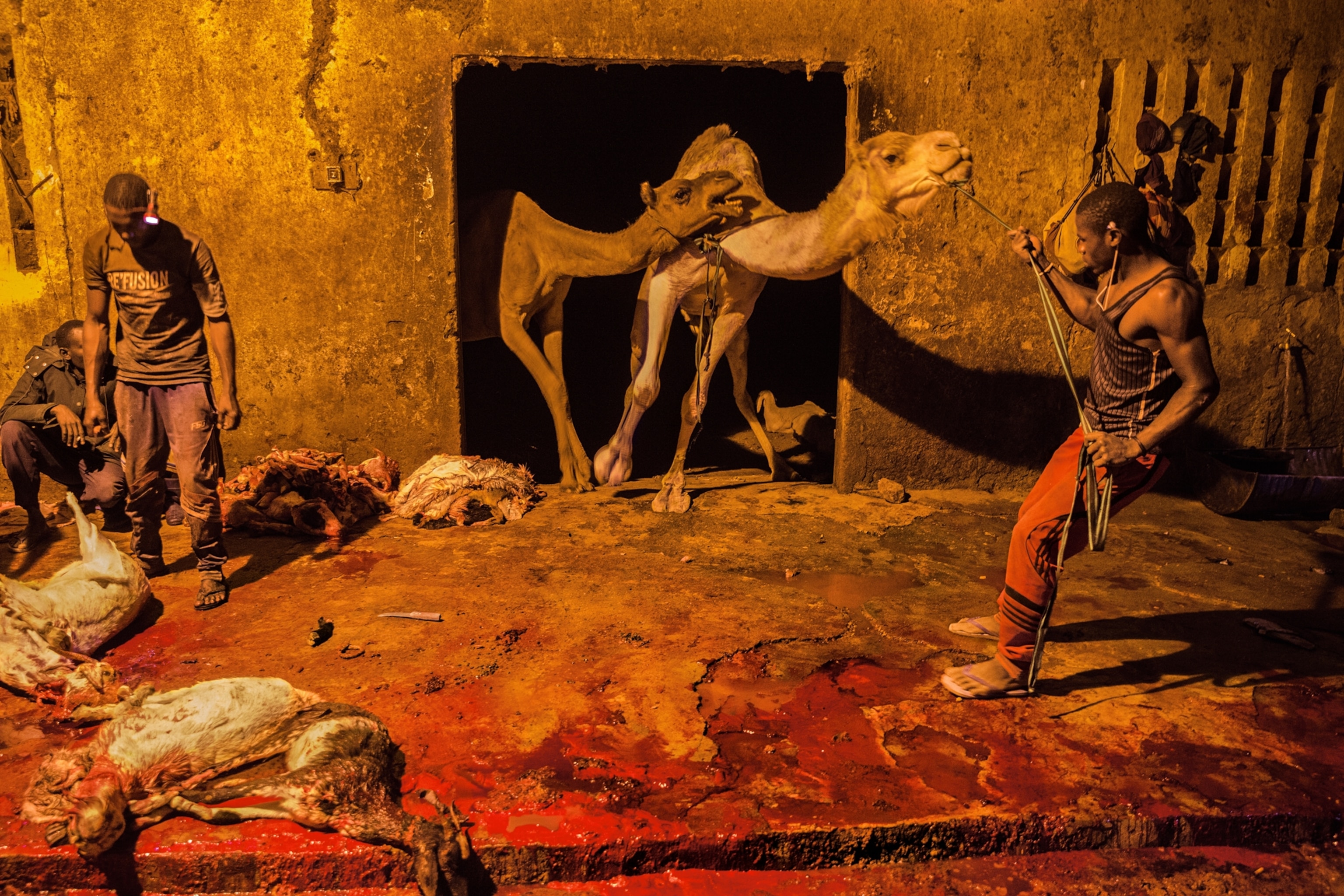
Even with the crackdown on human smuggling, Agadez’s location ensures it will remain a transit point for foreign travelers. Today it has a new type of guest. Known as Air Base 201, it is a military installation owned by the Nigerien government but leased by the U.S. and inhabited by some 550 of the latter’s Air Force personnel. Its existence is hardly a secret, but its American occupants are a discreet presence—showing up in Agadez to rebuild a school, or in a nearby village to construct a water well, but largely staying on base. When I visited in December, American military engineers were busily constructing a mile-long runway that can withstand desert conditions. C-17 and C-130 aircraft will use the runway, along with weaponized MQ-9 drones, which will not only monitor the activities of extremist groups but also target them.
These operations will extend well beyond the Agadez region and into the “rough neighborhood” that has bred extremist groups. “The enemy exploits these borders—which are very porous—all the time,” said Samantha Reho, spokeswoman for the U.S. Africa Command, responsible for overseeing the U.S. military’s role in Niger.
The counterterrorism mission comes with obvious risks, attested to by the October 2017 ambush. (No incidents of U.S. troops drawing fire have been reported in the past year.) But the American military presence is an act of national security self-interest, not foreign benevolence. As the State Department starkly describes it, “U.S. foreign assistance to Niger plays a critical role in preserving stability in a country vulnerable to political volatility, terrorism and the spread of violent extremism, food insecurity, and regional instability.”
Agadez itself has not been named in recent intelligence threat assessments, according to a U.S. defense official. But the presence of a military base and the city’s distance from the borderlands can protect Agadez for only so long. The conversations behind mud-brick walls reflect a gathering discontent. Young men enumerating their all but exhausted options. They had attended school, looked for work, played by the rules. With few jobs to be had, some found their place in the Boss’s racket. After seeing friends get arrested and their trucks impounded, they withdrew. And now they are waiting for whatever might come next.
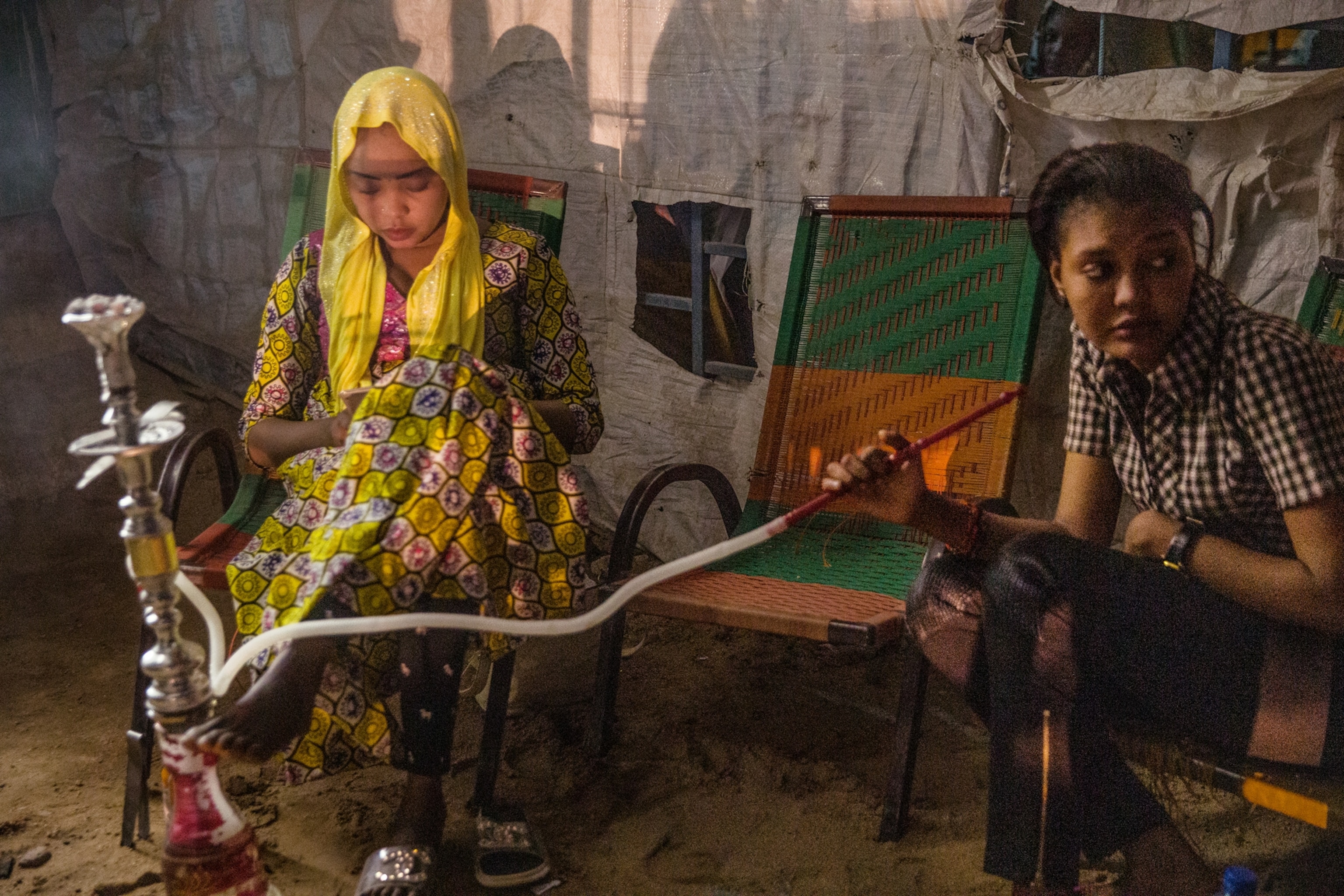
Meanwhile they were hearing about other young men making appeals: Looking for a job? We will pay. Need money for a wedding? We will pay. The YouTube videos and WhatsApp texts from the Nigerian jihadist group Boko Haram were making the rounds.
One evening at a fada—an ad hoc social gathering of young Nigerien men over hot tea and card games—an enterprising individual who had once made a decent living importing pickups but now had few takers bowed out of the crazy eights game and considered his lot morosely.
“Things cannot keep going at this rate,” he said quietly. “It will become a jungle.”
At the southern edge of the Sahara, a West African gold rush is under way. Thousands of men attack a rubble-strewn scrubland. Some swing pickaxes and use shovels. A few operate a power drill. Others have no tools at all—only rocks to loosen the dirt by hand.
Occasionally the ground shakes, accompanied by a muffled concussive boom: dynamite. It’s a more efficient way of digging, if rather dangerous and for that matter illegal—though many if not most of these men already are going about their work without an official government permit.
All around them stretches what one might call a tent city, except that the tents have been tattered by the winds into ribbons that flap above miners who lie snoring on the ground.
The squatter village is called Amzeguer, and it did not exist until about five years ago.
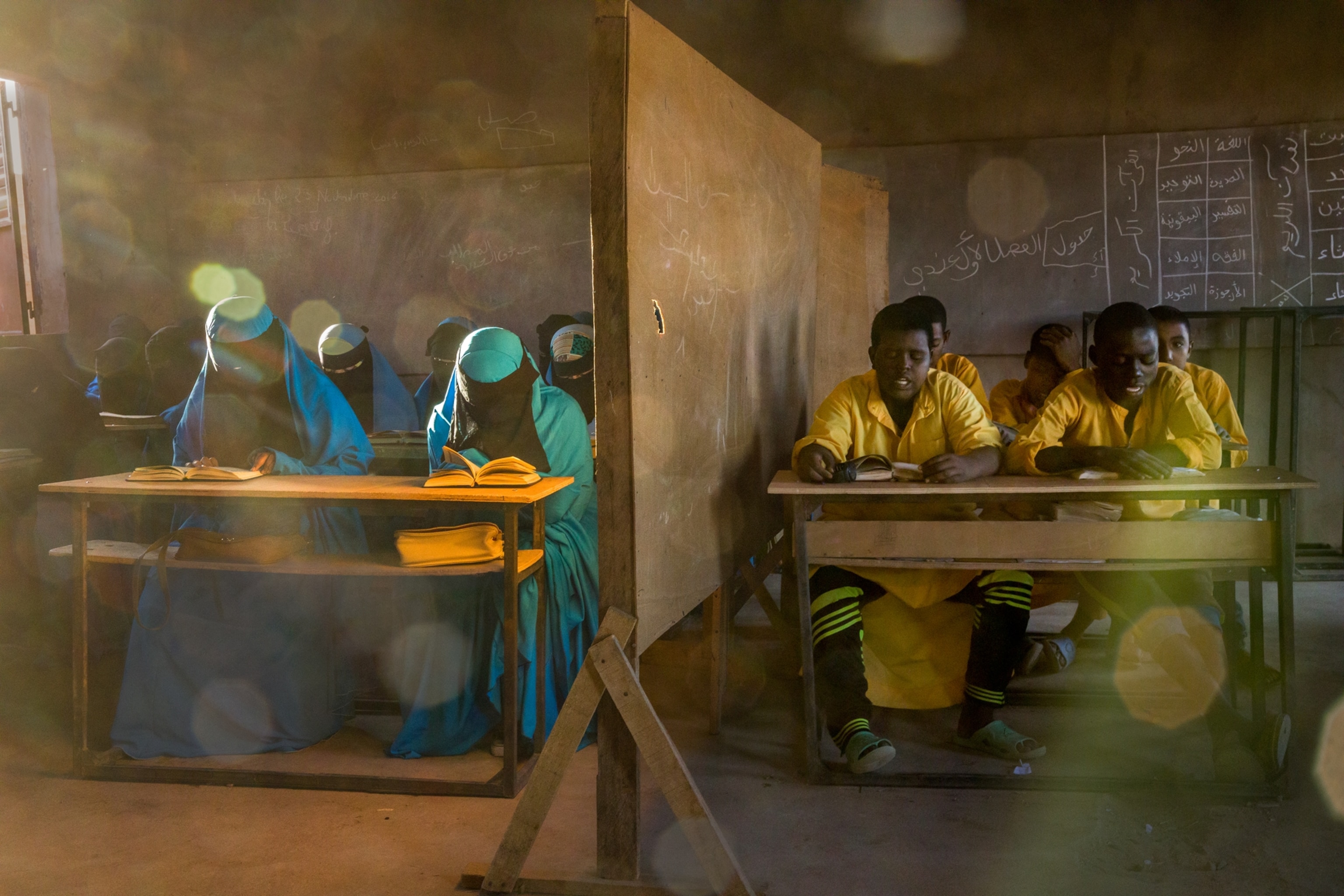
In a drearily familiar African paradox, Niger is mineral rich, the world’s fifth largest producer of uranium, even as it ranks lowest on the United Nations’ Human Development Index. (Its three largest mines are joint ventures with French multinationals. The plummeting price of uranium has led to layoffs of Nigerien workers.)
In 2017 the government closed its largest gold-mining area, on the Djado Plateau to the north—ostensibly because of terrorist activity, though more likely because of foreign miners coming in from Chad, Sudan, and Libya. Many of the Nigerien miners were now here, along with other men from Agadez whose labors constituted a desperate stab at a quasi-legitimate livelihood.
“Do I have hope?” says a 46-year-old man named Jamal, who then pulls his scarf away to reveal his sand-caked face. “Look at my beard. It’s turning white from hoping.”
Jamal stands on a hill pocked with deep holes. “We dug down to 53 meters deep, but then we hit water,” he says. “We need to flush it out. There’s a pump all of us share, but it broke down.” He points several yards away, to a lanky miner in a blue jumpsuit almost entirely coated with a film of dust. The man, along with his 11 sons (ages 12 to 30), had managed to dig a hole to 60 meters and had encountered traces of the precious mineral. “The gold’s right there waiting,” Jamal maintains. “We just need to find some money to fix our pump.”
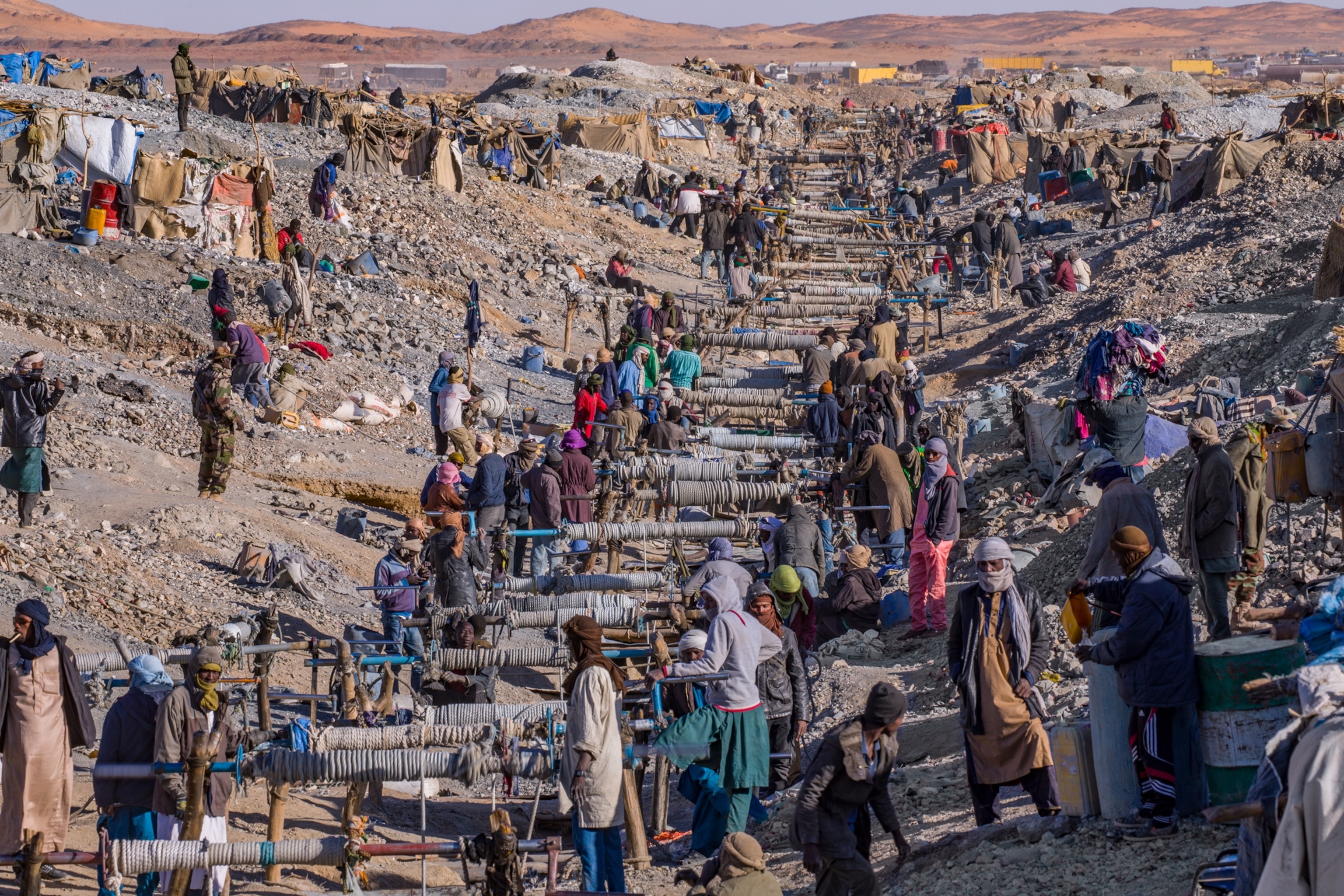
Amzeguer has been Jamal’s workplace for nearly three years. Before that he was a desert guide for migrants based in Agadez, with six drivers under his supervision. After the migration ban took effect, the police seized two of his pickups. Now he is a penniless artisanal miner. Several of his new colleagues died in the shafts after a tool was dropped on them or a mine collapsed. “Both jobs are risky,” he says.
“But,” he muses, “if someone calls me from the city, saying, ‘I’ve got 50 migrants, and can you help move them?’ of course I’ll do it.” Jamal’s voice is matter-of-fact. “If I can’t find gold, I’ll go back,” he says. “If not on a Hilux truck, then on a camel caravan, the way they used to.”
“Until very recently, you did not find thieves in Agadez,” said Sheikh Salahadine Madani, the imam of Agadez’s strict Islamic school, Daroul Kouran. “They would work in tourism or with migrants or go to the mines to find gold. Now, when I visit the prison, I see people I would never expect to see there. They are honest people who became desperate.”
The imam, visiting my hotel, sipped a Coca-Cola under the shade of a patio umbrella. His voice was heavy with lament. Nonetheless, he bristled when I mentioned to him that the orthodox Islamic movement he’s part of, known as Izala, has historical ties to Boko Haram’s founder.
“The Quran doesn’t say that you should kill innocents in the name of Islam,” he pointed out. Madani conceded, however, that the path from economic desperation to violent extremism was well worn. “Yes, I’ve seen this,” he said. “You hear kids sometimes talking about how they have no opportunities. You hear them in the streets talking about how maybe this is the only option left.”

Still, this option—calamitously antisocial, blasphemous, ultimately self-nullifying—seems anathema to West Africans, who go to astounding lengths to avoid it. Whatever one may think of the Boss and his clients, their sheer tenacity is astounding.
One morning at a shelter in Agadez that helps migrants return to their homelands, I met Mohamed, a 19-year-old from Ivory Coast who wore a necklace with a razor blade dangling from it. Mohamed had been there for five days.
He said, without going into specifics, that there had been family problems back in his village—and that, regardless, his dream had always been to live in America. And so, in August 2018, Mohamed paid for a six-day drive in the back of a pickup to Gao, in Mali. Along the way, he and the 19 other passengers were robbed and several of their water bottles slashed by bandits. They walked the final 70 miles in the desert to Algeria.
Mohamed spent a month working as an auto mechanic in the border town of Bordj Badji Mokhtar. He then traveled by foot and hitched rides into Morocco, hoping to find passage by water to Spain and from there to the U.S.
Instead Moroccan immigration authorities jailed him for five days. He then escaped back to Algeria, where he was briefly jailed again before being relieved of the last of his money. Finding no further use for him, Algerian authorities deposited Mohamed onto the back of a dump truck, which drove him into Niger and left him in the desert. After several days on foot, he arrived in Agadez, four months from the beginning of his fruitless journey.
When the mechanic had finished telling me his story, he did not seem particularly discouraged by it. Before I could offer any sympathy, he blurted out, “I don’t want to go home. I’ve decided on my goal.”
Mohamed had a new plan. He would return to Ivory Coast, make money, get a passport, and buy a direct flight to Morocco, bypassing the desert altogether. And then to the sea.
“If God gives me the chance,” he said, “and I arrive in Europe alive and healthy, I think I can make it”—by which he meant make it to America, a land of millions of vehicles in need of a clever mechanic.